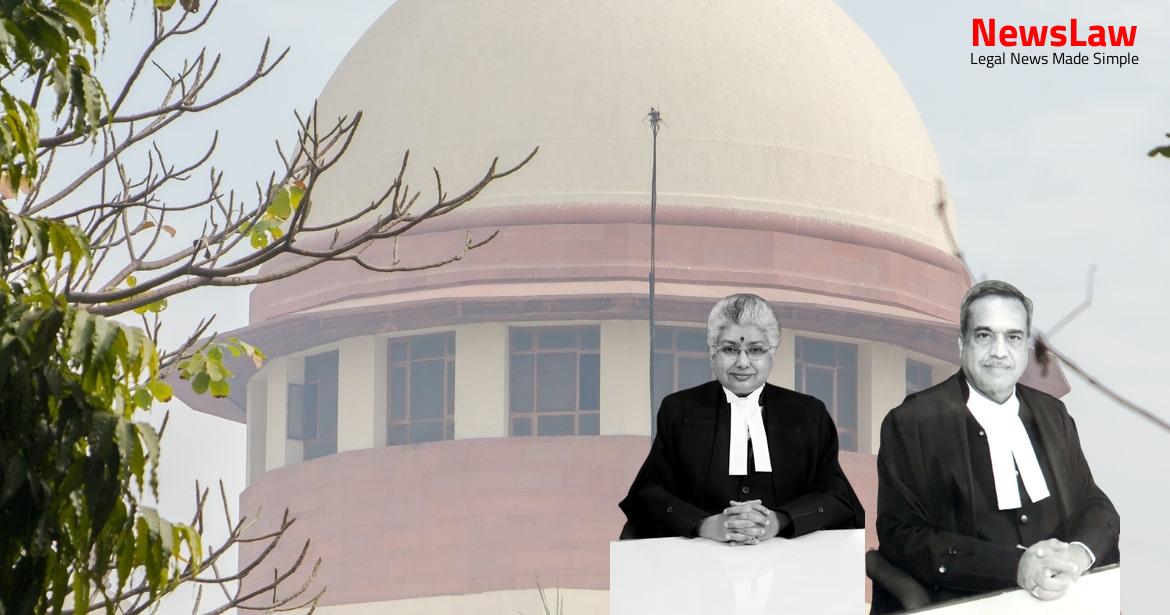In the case of M/s Bhanu Iron and Steel Company Ltd. vs. Commissioner of Customs, a dispute arose regarding the imposition of customs duty and interest on imported goods. The Commissioner confirmed the confiscation of goods under Section 111 of the Customs Act, leading the appellant to appeal before CESTAT. After multiple rounds of appeal and remand, the final order by CESTAT dated 30.04.2009 upheld the duty demands and penalties. The appellant’s plea for dropping the proceedings was not accepted, resulting in the current appeal.
Facts
- Appellant, M/s Bhanu Iron and Steel Company Limited, imported second-hand steel mill machinery and parts under Project Import Facility.
- 264 cases of imported goods were seized from outside the approved warehouse and confiscated under Section 111 of the Customs Act.
- Appellant sought permission to shift machinery parts to a shed within the factory premises to prevent damage from rusting and corrosion.
- Confiscation of goods valued at Rs.48,79,776.00 and duty amounting to Rs.39,03,821.00 was confirmed by the Commissioner.
- CESTAT remanded the matter back to the adjudicating authority for fresh adjudication considering new facts and documents.
- Multiple rounds of appeal and remand took place before the case reached the final order by CESTAT dated 30.04.2009.
- Duty demands, penalties, and interest amounts were imposed on the appellant for violations of customs regulations.
- Appellant’s plea for dropping the proceedings was not accepted, leading to the final appeal before the Court.
Also Read: Analysis of Abetment to Suicide Conviction
Arguments
- Learned counsel argued that CESTAT was not justified in upholding the order of the respondent applying Section 71 of the Customs Act for imposing interest on confiscated goods.
- The counsel pointed out that the applicable provision should have been Section 15(1)(c) of the Customs Act as the appellant had not cleared the warehoused goods, bringing Section 64 into play.
- Referring to a circular dated 12.07.1989 of the Central Board of Excise and Customs, the counsel emphasized its relevance to the appellant’s case.
- It was contended that CESTAT’s decision to uphold the application of Section 15(1)(b) for determining the rate of duty was erroneous.
- The counsel argued that under Section 64(d) of the Customs Act, the respondent could not have assumed the goods were removed from the warehouse without basis.
- The failure of CESTAT to consider the specific permission granted to the appellant by the proper officer, allowing the goods to be outside the warehouse but within the industrial/factory premises, was highlighted.
- The respondent justifies the adjudication order and the CESTAT’s confirmation of the order.
- Officers searched the appellant’s premises based on reliable information on suspected misuse of warehousing facility.
- A show cause notice was issued to the appellant after action was taken under the relevant provisions of the Customs Act.
- The appellant was denied the goods in question for a long time, justifying leniency.
Also Read: Challenges in Proof of Firearm Offence: Legal Analysis
Analysis
- Section 68 of the Customs Act pertains to clearance of warehoused goods for home consumption.
- Customs duty amounting to Rs.39,03,821.00 was directed to be recovered from the appellant for goods covered by 264 cases.
- Provisions of Sections 71 and 72 were found not applicable to the 264 cases at hand.
- Central Board of Excise and Customs issued Circular No.31/97-Cus. based on the decision in the Kesoram case.
- Section 15(1)(b) of the Customs Act would not be applicable in the case of the 264 cases found outside the notified warehouse.
- Interest under Section 28AB was imposed on the appellant for the 264 cases.
- The warehousing in the notified public bonded warehouse continued for the specified period.
- The permission granted by the Superintendent to the appellant for unloading outside the warehouse was not revoked.
- Goods cleared after expiry of the warehousing period would attract Section 15(1)(c) instead of Section 15(1)(b).
- The decision of the respondent to invoke Section 71 and levy interest on the goods under Section 28AB was deemed unjustified.
- CESTAT affirmed the decision of the Commissioner regarding recovery of customs duty and interest from the appellant.
- Section 67 allows the owner of warehoused goods to remove them to another warehouse with proper officer permission.
- There are specific time limits for goods to remain in warehouses based on their type, but extensions can be granted under certain conditions.
- Section 64 gives the owner rights to inspect, sort, and deal with warehoused goods with proper officer sanction.
- Importers of specified goods must execute a bond equal to thrice the assessed duty amount.
- Private warehouses can be licensed for dutiable goods when public warehouse facilities are not available, with provisions for license cancellation.
- Definitions of ‘warehouse’ and ‘warehoused goods’ are provided in Section 2(43) and Section 2(44) respectively.
- Customs duty rates and valuation for imported goods are determined based on specific events mentioned in Section 15.
- Section 61 outlines the period goods may remain warehoused, with conditions for clearance for home consumption.
- Proper officers can demand payment of full duty on warehoused goods if not removed within the permitted time frame.
- Bonds executed under Section 59 are discharged once goods are accounted for and all due amounts are paid.
- Section 110(1) empowers officers to seize goods liable to confiscation.
- Section 71 limits the removal of warehoused goods to specific purposes like home consumption or re-exportation.
- Section 72 addresses duties levied on goods improperly removed from warehouses.
- Circular dated 12.07.1989 directed immediate implementation of conclusions reached in a tripartite meeting regarding customs duty on goods in bonded warehouse beyond permitted period
- Circular dated 12.07.1989 was held binding on the Department in the case of warehoused goods removed after expiry of permitted period
- In Kesoram Rayon vs. Collector of Customs, it was decided that rate of duty for goods in bonded warehouse beyond permitted period should be calculated at the rate prevalent on the date of payment of duty
- Circular dated 12.07.1989 was withdrawn by subsequent circular dated 14.08.1997
- Simplex Castings Ltd. vs. Commissioner of Customs supported the applicability of circular dated 12.07.1989 on appeal filings before CEGAT
- SBEC Sugar Ltd vs. Union of India affirmed that goods cleared from warehouse after expiry of permitted period are deemed improperly removed under Customs Act
- Date on which the warehousing period ends is relevant for determining the rate of duty
- Section 15(1)(b) applies to goods cleared under Section 68
- Goods remaining in bonded warehouse beyond permitted period deemed improperly removed under Section 72
- Demand raised by respondent against appellant regarding customs duty and interest not applicable to present case
Also Read: Entitlement to Interest on Delayed Refund of Duty Drawback
Decision
- 264 cases of goods under Section 15(1)(c) of the Customs Act to be remedied by the parties within eight weeks
- Penalty of rupees one lakh imposed on the appellant under Section 112 of the Customs Act upheld due to unauthorized removal of goods
- Impugned order of CESTAT modified accordingly
- Appeal allowed in part, no costs awarded
- Demand of customs duty and interest on the 27 cases of goods sustained
Case Title: M/S BISCO LIMITED THROUGH ITS MANAGING DIRECTOR Vs. COMMISSIONER OF CUSTOMS AND CENTRAL EXCISE (2024 INSC 231)
Case Number: C.A. No.-004663-004663 / 2009



